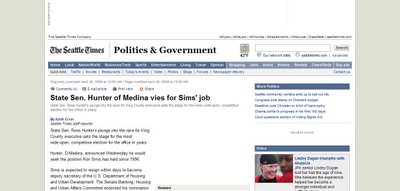Last night, the Washington's House of Representatives passed
EHB 1244, the
2009-2011 operating budget (PDF) that has been widely panned across the state as a failure of leadership. The House appears to have no plans to allow voters to opt to mitigate the pain of its budget by sending the people a revenue package; instead, jobs will be slashed, tuition hiked for students, aid to the vulnerable gutted, and seniors left to fend for themselves.
The House passed HB 1244 by a vote of fifty four to forty two. Democratic representatives casting a protest vote against the budget were Representatives Brendan Williams (D-22nd District), Bob Hasegawa (D-11th District), and Geoff Simpson (D-47th District). Cheers to the three of them for their courage.
There were also three Democrats who sided with the Republican caucus in voting against the budget for other reasons (Driscoll, Grant-Herriot, and Miloscia).
The budget now moves to the State Senate, where it is expected to be opposed by the entire Republican caucus, plus Senator Tim Sheldon.
And herein lies an opportunity for the chamber's progressive senators to stop this awful budget in its tracks.
If six progressive Democrats stood up together and told leadership they would not vote for the budget until the House and Senate agreed to send a revenue package to the people for a vote, they could tie up the whole process.
Such a bloc of senators could also potentially force House and Senate budget writers to allocate some of that $830 million they're "saving for later" to lessen the pain in the awful budget that's been proposed. Brendan Williams suggested doing so last night, but his Amendment 903 was voted down on a voice vote.
(Williams remarked this morning that he's "ready to vote NO on the slew of budget 'trailer' bills required to dismantle our social safety net per the no-new-taxes, all-cuts Republicrat budget that passed last night.")
Are there six senators willing to stick their necks out and do something courageous, just for the sake of the goodness of the State of Washington?
Perhaps not, but we do know that at least a couple of senators have gone on the record as saying their consciences do not sit well with the idea of passing a predictable, unconscionable all-cuts" budget.
Take Senator Kohl-Welles:
When our budget is released, it likely will be an all-cuts budget. This is something I cannot support. But I will work with leadership to present a tax package to the voters who can decide for themselves if they are willing to pay a small amount more in targeted taxes to maintain crucial programs.
I strongly believe that it would be counterproductive, resulting in "unintended consequences," to do otherwise.
(Emphasis mine). O
r Senator Adam Kline, who has concisely explained that passing an "all cuts" budget isn't just immoral, it makes no economic sense:
If we cut the state’s Basic Health Plan by 40% – as has been proposed – 40,000 individuals in our communities would no longer have a viable option to receiving needed medical care. That’s a crowd large enough to sell out Safeco Field.
It’s a mistake to think that the accounting savings realized from cutting this program will translate into actual savings.
After all, it’s not as if these 40,000 of our neighbors will suddenly no longer get sick or need medical attention. Many will simply wait until their situation becomes an emergency to get the care they need from hospitals – maximizing the toll taken on their health and the costs to our overall system.
Again, emphasis mine.
In the unlikely event that six Democratic senators are seriously contemplating putting the brakes on this budget (we're looking at you, Senators Kohl-Welles, Kline, Franklin, Jacobsen, Oemig, and McDermott) they can rest assured of one thing:
We'd have their backs in a heartbeat.
This has been a dreadful session,
marked repeatedly by Democratic spinelessness. It would be nice to see a few Democrats take a stand, bring this Sadnessville-bound train to a grinding halt, and throw the entire statehouse off balance.
At least then the session might end on an upbeat note. Even if such a move didn't win any major concessions, we'd at least be able to cheer on
some Democrats for doing
something courageous and sticking to their principles.
Yeah, Governor Gregoire wouldn't be pleased, but that would be a good thing: She actually thinks this budget is "responsible".
And no, I'm not kidding. She used the words "responsible budget" last night when she "congratulated" the House for passing EHB 1244.
I'm not sure what happened to the governor I knew and loved that did so much good for our state back in the good old days of 2005 and 2006.
But that governor, if she were still around today, would not accept this budget. That governor would refuse to sign off on a budget that shreds some of our most critical public services -
let alone propose such a budget.
But
that governor is gone. Where she went, we don't know. We at NPI would love to have her back. Washington needs her at this dire hour.
Apparently, courageous leadership at both the state and federal levels is too much to ask for. It's been missing in our nation's capitol for years. Now we finally have a President who is governing progressively. But we've lost our progressive governor and we certainly don't have a progressive Legislature.
We have a Legislature that only knows how to
spend money.
That's not a criticism of
where the Legislature has invested our common wealth. Last biennium, Democratic leadership bettered our state immensely by putting money into public services and infrastructure.
But now we're in a crisis and our Legislature doesn't have the guts or the wherewithal to
raise money. Tax reform seems to be considered a taboo subject. A few Democrats - Senator Kohl Welles and Senator Brown -
have gallantly spoken about the wisdom of switching to an income tax.
Bravo to them for starting that conversation.
And Representative Eric Pettigrew
came up with a plan to stave off some of the budget cuts by raising the sales tax slightly, and offsetting that increase for working families.
Unfortunately, that plan doesn't seem to be going anywhere.
In part, that's because polling has shown fairly lukewarm support for a revenue package. That's not surprising, because not everyone yet understands the magnitude of the cuts. Legislators are more familiar with the problem than their constituents, and yet it's like they're expecting voters to lead
them.
Come again? That's not real leadership. Real leadership means fighting for what you believe in, adhering to your values. Not letting polls and focus groups determine your course of action. That's following.
Especially at this moment, we need leaders to be in charge. Not followers.
I was listening to Representative Kathy Haigh on the floor sometime this past week, expressing hope that the economy would recover by the 2011 legislative session (and with it, state revenues) so that the cuts made as a result of this budget can be reversed. All I could do was shake my head and sigh.
That's it? The Legislature has resorted to hoping that the economy will just get better so it won't have to pass another irresponsible budget?
I'm sorry, but that attitude reeks.
Are we not in control of our own destiny? Do legislators not realize that they have the awesome power to
make laws? The duty to protect our quality of life? The authority to manage our common wealth?
The Legislature (and the Governor)
ought to be acting as stewards, safeguarding the people of Washington State from the economic turmoil wrought by years of Wall Street greed and the failed right wing agenda of the Bush administration.
That would be leadership.
Instead, we've got a bunch of people mindlessly and wearily parked at their desks inside the Capitol's grand marble halls, throwing up their hands - and throwing in the towel. Democratic legislators happily accepted the federal aid that Democrats in Congress sent their way, but they've done practically nothing on their end to protect our common wealth at a time when we desperately need it to be there for us. Instead, they're going to let it deteriorate on purpose.
That's a mistake, because our common wealth is the bedrock of our economy.
There's axiom that illustrates this truth that I like (by Anne Herbert) which hangs in one of the meeting rooms of the Redmond Regional Library.
It goes:
Libraries will get you through times of no money better than money will get you through times of no libraries.
If legislators truly took this to heart, perhaps they'd understand the pointlessness of passing a penny wise, pound foolish budget.
This approach is not cost effective.
People aren't going to stop getting sick. Students aren't going to teach themselves. Our environment won't magically start ridding itself of all the carbon dioxide, methane, and other climate pollution we're pumping into it.
One way or another, we're going to pay.
The question is not if, but when... and how much. Is there anyone out there who wants to make the argument that forcing people to go to emergency rooms when they're ill and dying is cheaper than investing in preventative care?
The right wing, of course, couldn't care less that we're abandoning people. In fact, jackals like Tim Eyman have had the gall to accuse legislators like Eric Pettigrew of trying to use the vulnerable as human props.
Just what we need: more shameless trash from our state's prime peddler of stupid, thoughtless right wing initiatives.
The whole point of having government, of having public services, is to do, as Abraham Lincoln said, for ourselves what we can't do individually.
We can't all afford to hire our own police force or firefighting squad, so government provides those things. Health services, which are being walloped by this budget, are no different. They're absolutely essential to our well being.
Republicans should be able to understand this.
The other day, Representative Mike Armstrong - a Republican - was on his way to the governor's mansion for a reception.
On his way up some steps, he suddenly had a heart attack. Fortunately, state troopers were nearby and they came to his aid.
They summoned paramedics, who took Representative Armstrong to Providence St. Peter's Hospital, where he is recovering.
Representative DeBolt, the Republican minority leader,
later issued a statement saying Republicans were relieved that troopers and the paramedics had come to Armstrong's side immediately and given him the medical attention he needed.
It's a good thing we have public employees who have devoted their lives to selflessly serving the people of Washington.
Grievously, the people of Washington seem to be represented right now primarily by men and women who are more preoccupied about what the opposition might say about them in the next election than doing their jobs.
Furthermore, the influence of big money induces their political posture rather than the public interest.
The funny thing about the Legislature - which is supposed to be an institution where majority rule prevails - is how easy it is for a small minority to throw sand in the gears of its machinery. All the Republicans are lined up, ready to oppose the budget that the Governor, Speaker Chopp and Majority Leader Brown have agreed on.
It would, again, take merely six disgusted Democratic senators to force everyone back to the table to come up with a better budget. There's no way all the cuts can be avoided. But damage could be minimized.
Does the scenario I've outlined have much of a chance of happening?
Probably not. But if it did happen... if six Democrats teamed together and splashed some cold water around the Capitol... it would sure would brighten the spirits of untold numbers of discouraged Washingtonians who are wondering:
Where has the party of working families vanished to?






